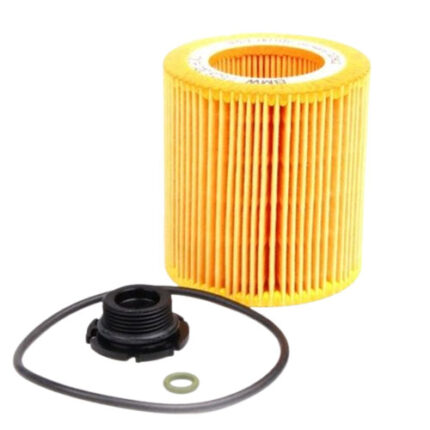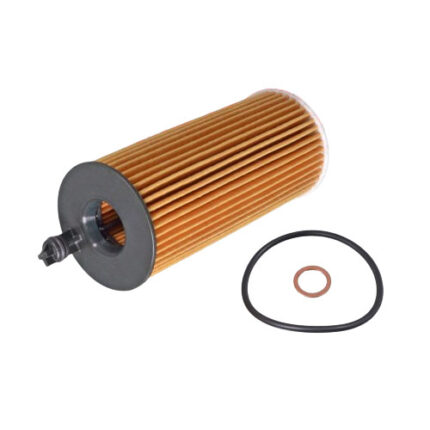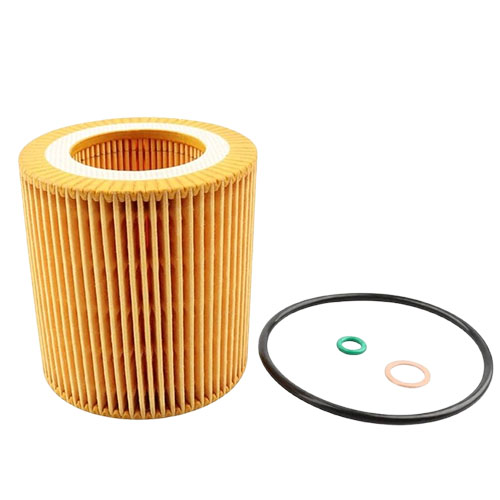Get BMW N52 3.0L Oil Filter Assy 11427953129 in Kenya
The oil filter assembly, often referred to as the lifeline of an engine, is an essential component in modern vehicles. It plays a crucial role in maintaining the health of the engine by ensuring the oil circulating through the system is clean and free from harmful contaminants. Here’s a comprehensive guide to understanding the oil filter assembly, its functions, benefits, and maintenance tips.
What is an Oil Filter Assembly?
An oil filter assembly is a system designed to remove dirt, debris, and metal particles from the engine oil. The assembly typically includes the following components:
- Filter Element: The core filtration material that traps contaminants.
- Housing: Encases the filter element and connects to the engine’s oil system.
- Bypass Valve: Ensures oil flow even if the filter is clogged.
- Anti-Drainback Valve: Prevents oil from draining back into the sump when the engine is off.
These components work together to ensure that the oil remains clean, lubricates engine parts effectively, and reduces wear and tear.
Functions of the Oil Filter Assembly
- Contaminant Removal:
The primary function of the oil filter assembly is to trap contaminants such as dirt, soot, and metal particles that accumulate in the engine oil during normal operation. - Maintains Oil Circulation:
Clean oil ensures smooth circulation throughout the engine, reducing friction and preventing damage to critical components like pistons, cylinders, and bearings. - Extends Engine Life:
By removing abrasive particles, the oil filter minimizes wear and tear, prolonging the engine’s lifespan. - Ensures Optimal Engine Performance:
A clean oil supply allows the engine to perform efficiently, maintaining optimal fuel economy and power output. - Regulates Oil Pressure:
The bypass valve within the filter ensures consistent oil pressure by allowing oil to flow even if the filter is clogged.
Types of Oil Filter Assemblies
- Cartridge Oil Filters:
- Contains a replaceable filter element inside a permanent housing.
- Environmentally friendly since only the filter element is replaced.
- Spin-On Oil Filters:
- Combines the filter element and housing into a single unit.
- Easy to install and replace.
- Magnetic Oil Filters:
- Incorporates a magnetic element to attract and capture metallic debris.
- High-Efficiency Oil Filters:
- Designed for advanced filtration with finer pores, ideal for modern engines requiring high-grade oil.
Materials Used in Oil Filters
- Synthetic Fibers: Offer superior filtration and durability, suitable for high-performance engines.
- Cellulose Fibers: Cost-effective and widely used in standard oil filters.
- Metal Mesh: Provides structural support and additional filtering capability.
Signs of a Failing Oil Filter Assembly
- Low Oil Pressure Warning Light:
A clogged oil filter can restrict oil flow, triggering the warning light. - Engine Noise:
Contaminated oil increases friction, leading to unusual engine sounds like ticking or knocking. - Oil Leaks:
A damaged or improperly installed filter can result in oil leaking from the assembly. - Dirty Exhaust Smoke:
Excess contaminants in the oil can cause incomplete combustion, resulting in smoke. - Reduced Engine Performance:
An inefficient oil filter affects lubrication, causing sluggish acceleration and reduced power.
Benefits of a High-Quality Oil Filter Assembly
- Enhanced Engine Protection:
Traps even the smallest particles, safeguarding sensitive engine components. - Improved Fuel Efficiency:
Clean oil reduces engine drag, optimizing fuel consumption. - Reduced Maintenance Costs:
Protects the engine from damage, minimizing costly repairs. - Eco-Friendly Operation:
Efficient oil filtration reduces emissions by ensuring cleaner combustion. - Compatibility with Advanced Oils:
High-quality filters work seamlessly with synthetic oils, ideal for modern engines.
Maintenance Tips for Oil Filter Assemblies
- Regular Oil Changes:
Replace the oil and filter as per the manufacturer’s recommended interval, typically every 5,000 to 10,000 kilometers. - Inspect for Leaks:
Check the filter and surrounding area for oil leaks, especially after replacement. - Use Genuine Parts:
Always opt for OEM or high-quality aftermarket filters to ensure optimal performance and longevity. - Follow Proper Installation Procedures:
Tighten the filter to the specified torque and ensure the gasket is correctly seated. - Monitor Oil Quality:
Regularly check the oil’s color and viscosity to detect issues early.
Choosing the Right Oil Filter Assembly
When selecting an oil filter assembly, consider the following factors:
- Vehicle Specifications:
Refer to the owner’s manual or consult with a trusted mechanic to determine the correct filter type and size. - Driving Conditions:
For harsh conditions (e.g., extreme temperatures or heavy towing), choose a high-performance oil filter. - Oil Type:
Ensure compatibility with the engine oil in use, whether conventional or synthetic. - Brand Reputation:
Trusted brands like Bosch, Mann, K&N, and OEM suppliers provide reliable and durable oil filters. - Budget:
While cost-effective filters are available, investing in a high-quality filter ensures better engine protection and long-term savings.
How the Oil Filter Assembly Works
- Oil Pump Action:
The engine’s oil pump pushes oil through the filter assembly under pressure. - Filtration Process:
The oil passes through the filter element, where contaminants are trapped, allowing clean oil to flow into the engine. - Bypass Valve Engagement:
If the filter is clogged or during a cold start, the bypass valve opens to maintain oil flow, protecting the engine. - Return to the Engine:
The cleaned oil re-enters the engine, ensuring proper lubrication and cooling.
Common Myths About Oil Filter Assemblies
- “All Filters are the Same.”
Reality: Filters vary significantly in quality and filtration capacity. Always choose the one suited to your engine’s requirements. - “Filters Don’t Need Regular Replacement.”
Reality: A clogged filter reduces oil flow, leading to engine damage. Timely replacement is crucial. - “Synthetic Oil Doesn’t Need Filtration.”
Reality: Synthetic oil also collects contaminants, making filtration equally important.
The Environmental Impact
Proper disposal of used oil filters is vital to reduce environmental pollution. Many service centers and recycling facilities accept used filters for safe disposal and recycling.
Conclusion
The oil filter assembly is a vital component of the engine’s lubrication system, ensuring smooth operation and prolonged lifespan. Regular maintenance, proper installation, and choosing the right filter are essential for optimal performance. Investing in a high-quality oil filter assembly not only protects the engine but also saves money in the long run by preventing costly repairs.
Follow us on Facebook for more parts.





Reviews
Clear filtersThere are no reviews yet.